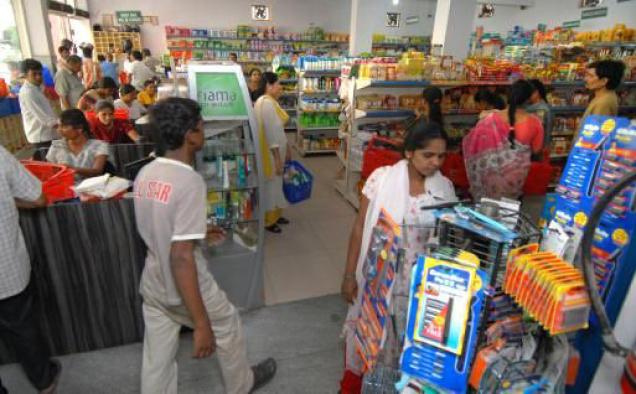
New Delhi, September 21: The government on Thursday evening braved intense political opposition and a nationwide bandh to notify the rules for allowing foreign retailers such as Walmart and Carrefour to set up stores in India.
The government also notified the relaxed conditions for single-brand retail as well as the norms for allowing 49% investment by foreign airlines in Indian carriers and permitting greater foreign investment in some sections of the broadcasting sector, sending out a clear message that it will not be cowed down by protests and effectively severing its relations with Trinamool Congress.
These notifications give effect to the decisions taken by the Cabinet last Friday, which have resulted in a political uproar and possibly threatened the long-term stability of the Manmohan Singh government.
Industry was quick to welcome the government's move. "...the notifications have been issued quite promptly, reflecting the government's strong commitment towards the reforms process. This will put to rest all apprehension on whether there would be any turnaround," said CII Director-General Chandrajit Banerjee.
The policy says foreign retailers can only open stores in states that have agreed to allow FDI in multi-brand retail. "The above policy is an enabling policy only," said the press note issued by the Department of Industrial Policy & Promotion.
Bar on Online Retail Trading
"State governments and Union Territories would be free to take their own decisions in regard to implementation of the policy," said the DIPP press note. The policy prohibits retail trading through e-commerce by companies with FDI engaged in multibrand retailing. This means the ban on FDI in B2C e-commerce continues, preventing Amazon and others from entering India.
The states that have agreed to allow foreign investment in multibrand retail, according to the press note, are Andhra, Assam, Delhi, Haryana, J&K, Maharashtra, Manipur, Rajasthan, Uttarakhand and the UTs like Daman & Diu and Dadra and Nagar Haveli.
The new rules stipulate that foreign retailers will have to invest a minimum of $100 million, and at least 50% of the total FDI brought in will have to be invested in backend infrastructure. They will have to source 30% of products from small industry within five years of operations, and every year subsequently.
Moreover, if a small industry crosses the $1-million investment mark in plant and machinery, purchases from it will not be counted towards the 30% mandatory sourcing requirement. If a state does not have a city with one million population, an exemption can be made.
The DIPP has also notified the relaxed rules for single-brand retail trading, allowing foreign retailers with more than 51% FDI the freedom to locally source 30% of the value of goods sold over a five-year period initially, and every year subsequently.
It also relaxed the condition that the single-brand retailer has to own the brand, allowing any one entity to retail the brand. Even FDI-funded single-brand retailers will not be allowed to sell their goods through e-commerce.
"The guidelines will allow many single-brand retail companies to come to India," said Diljeet Titus, senior partner at Titus & Co, which is working with foreign retailers looking to enter India.






Comments
Add new comment